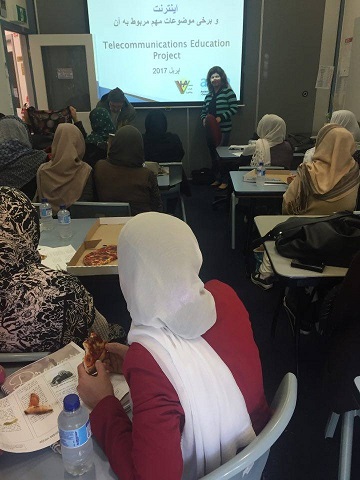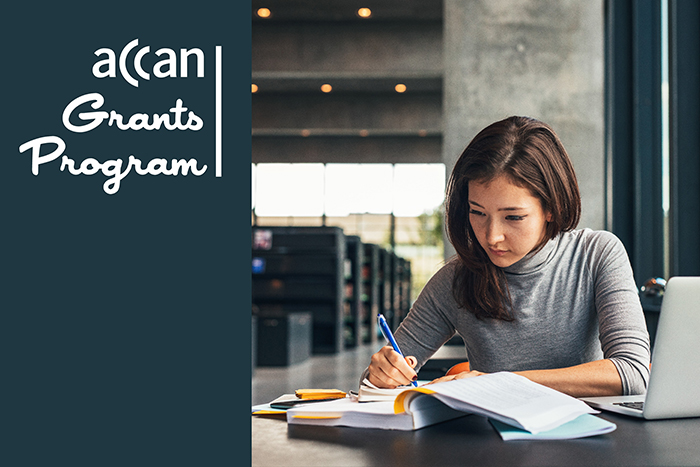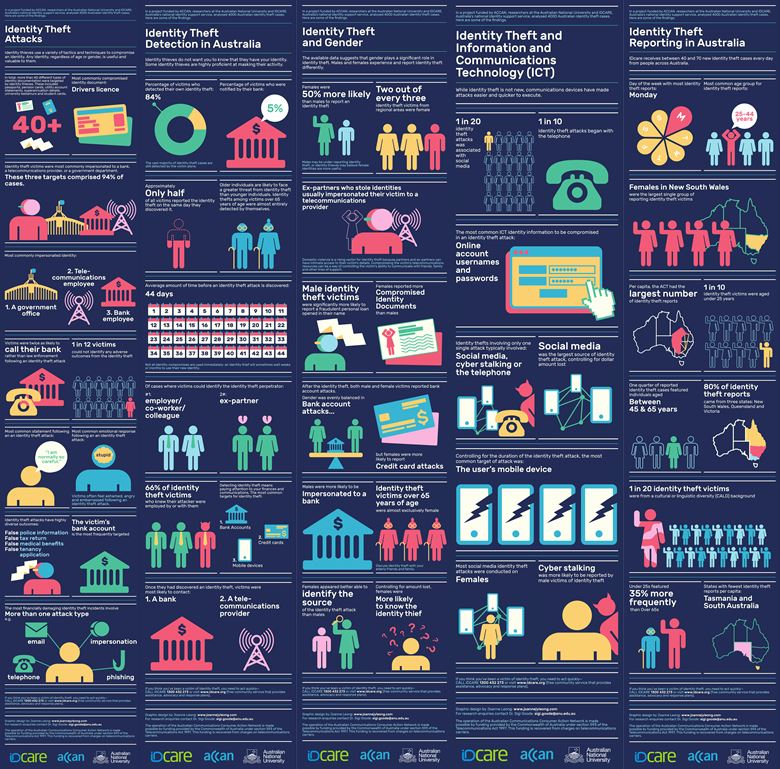ACCAN administers an Independent Grants Scheme aimed to support consumer research and consumer representation that helps us achieve our strategic goals
- Details

University of Sydney, Charles Perkins Centre
Grant round: 2016
Amount: $59,842.30
Read more: Finding peace of mind: Navigating the marketplace of mental health apps
- Details
 Queensland University of Technology, Digital Media Research Centre
Queensland University of Technology, Digital Media Research Centre
Grant round: 2016
Amount: $59,860
Read more: Australian consumer access to digital media content
- Details

The Association of Hazaras in Victoria
In partnership with the Victorian Afghan Associations Network
Grant round: 2016
Amount: $7,500
- Details
Australian National University, Research School of Management
In partnership with IDCare, and the University of the Sunshine Coast, Centre for Human Factors & Sociotechnical Systems.
Grant round: 2016
Amount: $44,965.50
Read more: Understanding Consumer Identity Theft Risks Across Communications Media
- Details
The Communications Law Centre, UTS
Grant round: 2015
Grant: $30,522
Read more: Improving the Communication of Privacy Information for Consumers
- Details
Monash University
Grant round: 2015
Grant: $14,572
Read more: Going Online on Behalf of Others - an investigation of ‘proxy’ internet consumers
- Details
Curtin University
Grant round: 2015
Grant: $26,200
- Details
Department of Media and Communications, the University of Melbourne
Grant round: 2015
Grant: $49,267
- Details
Media Access Australia (MAA)
Grant round: 2015
Grant: $55,706
- Details
 The Panel assesses applications to ACCAN's Independent Grants Program and recommends the strongest applications to the ACCAN Board for funding. The Panel is an important part of ensuring the independence and rigour of the Grants Program process.
The Panel assesses applications to ACCAN's Independent Grants Program and recommends the strongest applications to the ACCAN Board for funding. The Panel is an important part of ensuring the independence and rigour of the Grants Program process.
- Details
 ACCAN is committed to best serving telecommunications consumers by administering a high quality Grants Program that is responsive to consumer needs. We have a two-stage application process, with only Streams depending on the type of work you are planning to do.
ACCAN is committed to best serving telecommunications consumers by administering a high quality Grants Program that is responsive to consumer needs. We have a two-stage application process, with only Streams depending on the type of work you are planning to do.
- Choose your Stream
- Expression of Interest stage
- Expression of Interest form
- Full Application stage
- What should I put in the budget?
- Accessibility
- Top Tips
- Additional resources
First, choose your Stream
You can apply under one of two Streams:
1. Research Stream
Choose this Stream if your proposed project is predominantly research.
2. Education and Representation Stream
Choose this Stream if your proposed project is predominantly consumer education and/or representation.
The lead applicant MUST be from the community sector, or demonstrate strong and genuine community sector partnership.
Expression of Interest stage
Expressions of Interest are completed via a shortened application form and assessed according to the Guidelines by the Independent Grants Panel.
Step 1 - Read the Guidelines and Strategic Plan.
Step 2 - Create a rough draft of your project idea.
Step 3 - Contact the grants team to review the idea and get advice on whether it is likely to be considered eligible:
Email: grants @ accan.org.au
Call: 02 9288 4000
Or contact us through the National Relay Service
Step 4 - Complete the Expression of Interest form on the SmartyGrants application portal. (You will need to register for a SmartyGrants account if you don't already have one.)
Step 5 - Submit your application online by the due date stated in the Guidelines. Late applications will not be accepted. Note that closing times are in Australian Eastern times.
Expression of Interest form
Download a sample copy of the EOI application form below. Use this to help prepare your application offline or with a team.
Do NOT submit this sample form. All applications MUST be submitted online via the SmartyGrants application portal.
The 2024 application form will be shared here when the round opens. It is expected to be similar to last year's:
Download: ![]() 2023 ACCAN Grants EOI Form - sample.docx88.81 KB
2023 ACCAN Grants EOI Form - sample.docx88.81 KB
Full Application Stage
If your Expressions of Interest is successful, you will be invited to submit a Full Application, also via SmartyGrants. Use the same login details as you used at the EOI stage.
A Word version of the application form will be provided below. As with your EOI, you cannot submit this sample form. You must submit your application online via the SmartyGrants application portal.
Download: ![]() 2023 ACCAN Grants Full Application form.docx105.97 KB (2024 application form will be provided after the round opens)
2023 ACCAN Grants Full Application form.docx105.97 KB (2024 application form will be provided after the round opens)
We strongly encourage all Full Application stage applicants to consult the Guidelines and to contact the ACCAN Grants Team to discuss your application to ensure it is eligible and competitive. Please note that answers in the Full Application form do not have to match those given at the EOI stage - applicants are able to change their answers to strengthen their applications by adding further detail, clarifying any areas, or adjusting approach. The amount requested can also be adjusted, though any substantive change should be justified.
Supporting documents
If the Assessment Panel needs more information such as annual reports or other documents, they will request it. They do not need to be uploaded at the time you make the application.
What should I put in the budget?
You are required to submit a budget with your application. You must think of all the income components from every source. You must think of, and reasonably estimate, each cost (expense) necessary for your project.
Income and expenditure need to add up to the same amount: you can't spend more than the project receives, and you can't spend less either.
Income
The income table is a summary of all other sources of funding you will be using for this project (e.g. if your organisation is contributing cash or in-kind support). If you have another grant for this project, show that grant in the list. Each source should be listed separately. Make sure your Total Income is the same amount as Total Expenditure. These two figures need to equal each other.
Expenses
In the expenses table, list all costs directly associated with the project. You may need to buy or rent equipment, fund a research worker, pay for travel, printing, or even room hire. Think through all the things you will need to make your project a success. If you have included in-kind in the income, then make sure you include it as part of the total expenditure. Expenditure is the list of things that are expended as part of the project.
Only include travel that is absolutely necessary for your project, and this needs to be well justified. Simply presenting results at a conference is not sufficient justification as the activities must form an integral part of the project.
Will ACCAN fund overheads?
ACCAN won't fund overheads, such as administration levies, general office space and so on. We do not cover normal operating costs for an organisation to do its business either. Check the complete list of exclusions in the Guidelines. The grant program funds clearly defined projects and project activity towards specific outputs.
We do cover all costs that are directly attributable to the project itself, e.g. project labour, project management, project accounting, or even office space and room hire if it can be justified as directly attributable to the project.
It all depends on how clearly the cost is related to the project - If you were not doing this project would the cost still exist? If yes, then we will not cover it. Is it an arbitrary levy added by your organisation on top of the project? If yes, we won't cover it. We only cover costs for activities inside the project.
Do I include GST?
No. All amounts you put in the budget should exclude GST. If you are successful, GST will be paid in addition to the amount you apply for.
Accessibility
All resources produced under the Grants Program need to conform to basic accessibility principles. This means that:
- all documents, images and webpages are accessible to screen readers ie. You are using alt text on images and Heading Styles are consistent
- digital resources such as videos contain captions and audio description, or a transcript.
Ensure your application demonstrates your plan for this, or if some resources are intended to not be made accessible, your justification. ACCAN staff can provide guidance before you apply.
If you are funded, ACCAN will meet with you early in your project to confirm your plans for accessibility. We have accessibly-formatted templates that we can share with you for writing reports, or if you will be using a graphic designer or web developer without experience in accessibility, we can highlight the key design features they’ll need to consider.
Download our basic instructions on how to make documents accessible:
Download: ![]() How to make documents accessible.docx4.02 MB
How to make documents accessible.docx4.02 MB
Top Tips
- Ensure your project fits: Is it really a telecommunications project? Does it satisfy one of the listed priorities? Read the Guidelines well, and contact us to discuss your project idea.
- Write in clear, simple English: avoid jargon and long-winded sentences. Say exactly what you're going to do.
- Be specific: Rather than "a large number of consumers will benefit" say "150 consumers in the Armidale community will access tailored digital literacy training programs."
- Balance your budget: Income needs to equal expenditure. Include all cash and in-kind contributions. Be realistic about what time and resources you will need. This shows you have thought things through.
- Demonstrate that you understand the context for your project - what gap are you filling in terms of the research and other work that already exists? Check other published work, including ACCAN's research, and government bodies such as communications regulators.
- Clearly explain how your project differs from other related projects that exist. This is particularly important for projects involving cyber-safety and digital literacy training. This is because the Australian government and other not-for-profits are addressing these issues through various training programs. If you see a gap or a limitation to these resources, explain why and how your project is addressing a significant gap. Ensure you refer to the ACCAN resources already available. If you are developing new materials, how will they complement what's already 'out there'?
- Clearly explain the future your project will have after our funding ceases. Do you expect the work to continue in any way? What provisions have you included in your planning to ensure this can happen?
- Look through our previous grants projects to get a better understanding of what and who we fund.
Additional resources
- Tips for writing applications and avoiding common grant-writing mistakes: https://www.fundingcentre.com.au/help/writing-grant
- GrantEd guides to writing applications: https://thegrantedgroup.thinkific.com/
- How to harness your advocacy skills for best results: https://www.communitiesincontrol.com.au/cic/take-control/
- Other grants from the Commonwealth: www.communitygrants.gov.au

